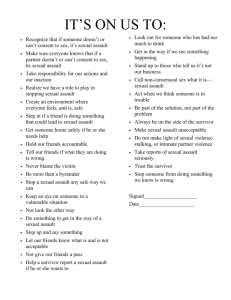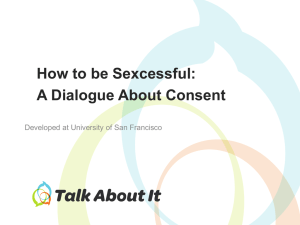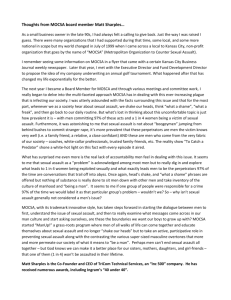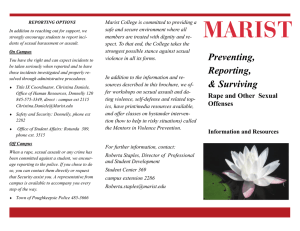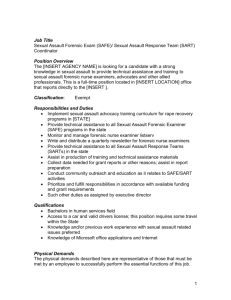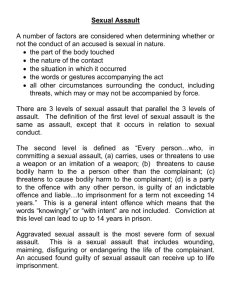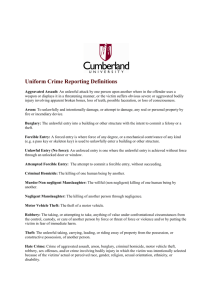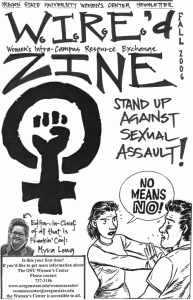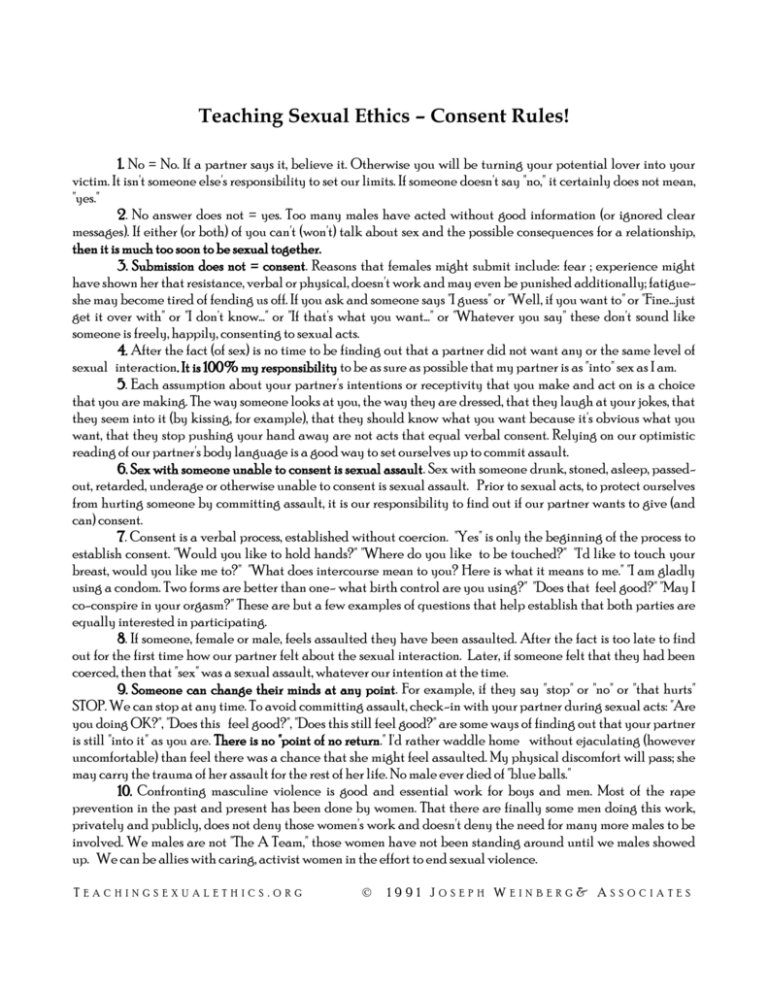
Teaching Sexual Ethics – Consent Rules!
1. No = No. If a partner says it, believe it. Otherwise you will be turning your potential lover into your
victim. It isn't someone else's responsibility to set our limits. If someone doesn't say "no," it certainly does not mean,
"yes."
2. No answer does not = yes. Too many males have acted without good information (or ignored clear
messages). If either (or both) of you can't (won't) talk about sex and the possible consequences for a relationship,
then it is much too soon to be sexual together.
3. Submission does not = consent. Reasons that females might submit include: fear ; experience might
have shown her that resistance, verbal or physical, doesn't work and may even be punished additionally; fatigueshe may become tired of fending us off. If you ask and someone says "I guess" or "Well, if you want to" or "Fine...just
get it over with" or "I don't know..." or "If that's what you want..." or "Whatever you say" these don't sound like
someone is freely, happily, consenting to sexual acts.
4. After the fact (of sex) is no time to be finding out that a partner did not want any or the same level of
sexual interaction. It is 100% my responsibility to be as sure as possible that my partner is as "into" sex as I am.
5. Each assumption about your partner's intentions or receptivity that you make and act on is a choice
that you are making. The way someone looks at you, the way they are dressed, that they laugh at your jokes, that
they seem into it (by kissing, for example), that they should know what you want because it's obvious what you
want, that they stop pushing your hand away are not acts that equal verbal consent. Relying on our optimistic
reading of our partner's body language is a good way to set ourselves up to commit assault.
6. Sex with someone unable to consent is sexual assault. Sex with someone drunk, stoned, asleep, passedout, retarded, underage or otherwise unable to consent is sexual assault. Prior to sexual acts, to protect ourselves
from hurting someone by committing assault, it is our responsibility to find out if our partner wants to give (and
can) consent.
7. Consent is a verbal process, established without coercion. "Yes" is only the beginning of the process to
establish consent. "Would you like to hold hands?" "Where do you like to be touched?" "I'd like to touch your
breast, would you like me to?" "What does intercourse mean to you? Here is what it means to me." "I am gladly
using a condom. Two forms are better than one- what birth control are you using?" "Does that feel good?" "May I
co-conspire in your orgasm?" These are but a few examples of questions that help establish that both parties are
equally interested in participating.
8. If someone, female or male, feels assaulted they have been assaulted. After the fact is too late to find
out for the first time how our partner felt about the sexual interaction. Later, if someone felt that they had been
coerced, then that "sex" was a sexual assault, whatever our intention at the time.
9. Someone can change their minds at any point. For example, if they say "stop" or "no" or "that hurts"
STOP. We can stop at any time. To avoid committing assault, check-in with your partner during sexual acts: "Are
you doing OK?", "Does this feel good?", "Does this still feel good?" are some ways of finding out that your partner
is still "into it" as you are. There is no "point of no return." I'd rather waddle home without ejaculating (however
uncomfortable) than feel there was a chance that she might feel assaulted. My physical discomfort will pass; she
may carry the trauma of her assault for the rest of her life. No male ever died of "blue balls."
10. Confronting masculine violence is good and essential work for boys and men. Most of the rape
prevention in the past and present has been done by women. That there are finally some men doing this work,
privately and publicly, does not deny those women's work and doesn't deny the need for many more males to be
involved. We males are not "The A Team," those women have not been standing around until we males showed
up. We can be allies with caring, activist women in the effort to end sexual violence.
TEACHINGSEXUALETHICS.ORG
1991 JOSEPH WEINBERG& ASSOCIATES



